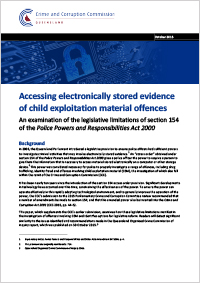
In 2006, the Queensland Parliament introduced a legislative provision to allow police officers to obtain an order in a search warrant that requires a person to give access information to police (an “access order”; section 154 of the Police Powers and Responsibilities Act 2000). Although this provision was intended to ensure that police had sufficient investigative powers, the effectiveness of the power is constrained by significant developments in technology. In the context of CEM, the limitations of the power can mean that police are unable to secure evidence to prosecute offenders or identify and remove children involved in CEM from harm.
This paper examines how the legislative limitations of section 154 manifest in the investigation of offences involving CEM. The paper identifies options for reforming the provision to ensure that:
- police are able to obtain access orders in all of the situations where they require access information
- the scope of access orders is sufficient to enable police to obtain required access information, and to access data accessible from but not physically located at the search warrant premises (for example, data in cloud storage services)
- the likelihood of non-compliance with access orders is reduced.
